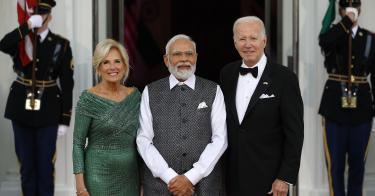Indian Prime Minister Narendra Modi’s state visit this week was ostensibly a success.
The prime minister enjoyed a rousing welcome from Congress and a congenial White House visit, culminating in a state dinner Thursday.
He and President Joe Biden announced deals on everything from jet engines to semi-conductors that will strengthen security and technology ties between the United States and India, which is highly desirable.
But one key issue remains unaddressed.
The very day Modi arrived in Washington, Reuters announced that Indian imports of Russian crude oil hit a new high in May.
>>> India, Russia, and the Ukraine War
While it’s all fine and well for Modi and Biden to issue a joint statement affirming their commitment to “Catalyzing the Clean Energy Transition,” that doesn’t change the fact that India’s accelerating energy needs are being met by fossil fuels from Russia, with President Vladimir Putin using revenues to help fund the Ukraine war.
Addressing Indian reliance on Russian energy should be a top priority for the United States, which is, after all, the lead donor to the Ukrainian side of the war by a considerable margin, not to mention one of the world’s largest energy producers.
Doing so will take more than U.S. and EU sanctions on Russian energy exports, which do not prohibit Indian fuel imports.
Indeed, the Biden administration has even encouraged such imports in the hopes of keeping US domestic energy prices down.
Worse, India has taken advantage of a provision in EU regulations to sell refined energy products it imports, regardless of their country of origin, as if they were produced in India—thereby turning a profit from selling Russian energy to the Europeans, even as Putin wages war in Europe.
For his part, Putin has demonstrated a willingness to use energy to coerce Modi into supporting him on Ukraine.
Last month, he threatened to withhold energy contracts if India didn’t oppose the potential black-listing of Russia by the Financial Action Task Force.
The United States has turned a blind eye to this problem, leaving Modi vulnerable to Putin’s energy blackmail, even as Biden hosts him at the White House.
It doesn’t have to be this way.
Washington can and should take a supportive, collaborative approach with New Delhi rather than a punitive one through sanctions.
An important first step would be coordinating with India to make sure it has a dependable supply of energy imports both from America and other major allied energy producers.
The Trump administration moved in this direction in 2018 when it ended Significant Reduction Exceptions for Iranian oil.
Unfortunately, when the Biden administration refused to offer such coordination, India quickly resumed Iranian sanctions-busting activities.
To change course now would require America to actually behave like an energy superpower whose bountiful resources are a key strategic asset—not like an energy-vulnerable nation, whose only option is to coordinate releases from strategic petroleum reserves with other consumers.
There are larger stakes in play here.
In the emerging confrontation between the United States and the China, India may well prove to be America’s most important ally in southeast Asia, which is an enormous opportunity for both countries.
The largest democracy in the world is soon to be the largest country in the world (if it isn’t already), boasting a huge labor force and developing industrial sector as well as a strong military.
But India can’t be a US partner on China and a Russian partner on energy.
Disaggregating Russia and China is increasingly a thing of the past, as both Putin and Xi publicly celebrate their increasingly close engagement, as well as their enmity for the United States.
Modi knows this, and recently halted talks about a rupee-ruble trading platform due to the ruble’s exposure to the Chinese yuan.
But the United States will have to be forward leaning on our own energy policy to help him decisively break with Russia on energy—and none of that was on the table in Washington this week.
Despite all the good will shown Modi by Congress and Team Biden, leaving the Russian energy issue unresolved is a major failure that could materially undermine all the recent progress.
Biden does India no favors by pretending that the prime minister can have it both ways, and if the administration continues to ignore the energy issue due to its climate agenda, India’s many friends and supporters in Congress should take it up for the benefit of both our nations.
This piece originally appeared in the New York Post




